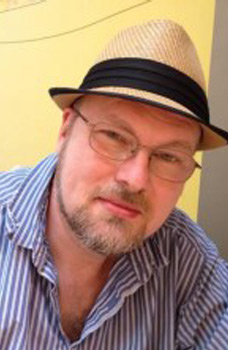
How to pronounce David R. Gillham: GILL-um
David R. Gillham discusses his 2022 novel Shadows of Berlin
Where did the idea for Shadows of Berlin come from? Where do you start when writing a new book?
I had been very interested in the idea of survivor's guilt, and I wanted to explore the aftereffects of trauma and what the living owe to the memory of the dead.
All your books have dealt with World War II in some way. What brings you back to this era in history?
I have been interested in the Second World War since childhood. On a personal note, my father served in the army during the war. More broadly, I believe the war shaped the world we live in today. And we are still dealing with many problems the war created or failed to address. So I believe it remains relevant and very fertile ground for fiction.
While we come to understand Angelika, the narrative does not forgive her actions. Do you think it matters why people do bad things? Should it change the consequences they face?
I have always searched out the "gray" areas of my characters' actions and intentions. No one is totally good or totally bad in my books; no one rides for free. Everyone must pay a price for their actions. I don't expect readers to feel any particular sympathy for Angelika. In the end, she was still a murderer. But I do hope readers are moved to discuss the relationship between trauma, power, and personal actions and their consequences and come to their own conclusions.
Rachel's development of her self-portrait is vividly rendered. How would you compare her artistic process to your own?
In some ways, they represent two very different approaches to art. Rachel paints to both honor her mother's death and forgive her mother's abuses. Also to forgive herself. There is a great desperation fueling Rachel's painting.
My writing, on the other hand, is less of a compulsion and more of a vocation. (Though I can never imagine myself quitting the habit!) And yet? At a basic level, both Rachel and I are compelled to create. Growing up, I had a strong interest in both history and art and thought I might become a historical illustrator. But writing eventually won me over. Still, Rachel and I share the joys and trepidations of creating a whole out of nothing—whether we are faced with an empty canvas or a blank page.
When they meet, Rachel is still a refugee in a Lower East Side residence hotel. Aaron is at loose ends, unsure of his direction after the army. Rachel is in need of security, and Aaron is a young man in search of purpose. Why, as the author, would you say they fell in love? What are their greatest challenges to their marriage?
They fell in love because they both felt lost, and marriage seemed a perfect refuge for them. But Rachel has secrets that disrupt the "normal" life she is supposed to be leading. Her heart is a secret, even to herself. And as the book opens, after seven years of marriage, things are not so simple between them. Aaron likes married life, though marriage to a former displaced person is not as easy as he might have imagined it. She's a refugee from the ash pit of Europe, lovely and feline and exotic—and broken. He thought he was saving her, of course. A Jew from Flatbush making the ultimate American mitzvah—saving the persecuted waif from her own brutalized past. But as it turns out, maybe he's not the savior he thought he might have become. Maybe he needs some saving himself.
And as the story spins, both Rachel and her husband must deal with their own brands of guilt. Rachel's guilt is triggered by her horrific experiences during the war and by the lengths she was forced to go to in order to stay alive. And Aaron's guilt is that of one of the multitude of American Jews who, while the chimneys of Auschwitz smoked, lived lives sheltered by democracy, safe from the atrocities perpetrated across the ocean. All this is wrapped up into Aaron's desire for children and Rachel's resistance.
Though Rachel finds a sense of equilibrium at the end of the book, she is not "cured" of her trauma. What do you most want readers to take away from this representation of her emotional health struggles?
I don't think that grief and guilt are easily overcome. A person can spend a lifetime coping with them. But this is a story of survival and redemption. It's a story of the trauma, of self-preservation, and of betrayal and remorse. But in the end, I do want the reader to believe that it is also a story of hope. Because hope is a vital regenerative force.
Unless otherwise stated, this interview was conducted at the time the book was first published, and is reproduced with permission of the publisher. This interview may not be reproduced or reprinted without permission in writing from the copyright holder.
Censorship, like charity, should begin at home: but unlike charity, it should end there.
Click Here to find out who said this, as well as discovering other famous literary quotes!
Your guide toexceptional books
BookBrowse seeks out and recommends the best in contemporary fiction and nonfiction—books that not only engage and entertain but also deepen our understanding of ourselves and the world around us.